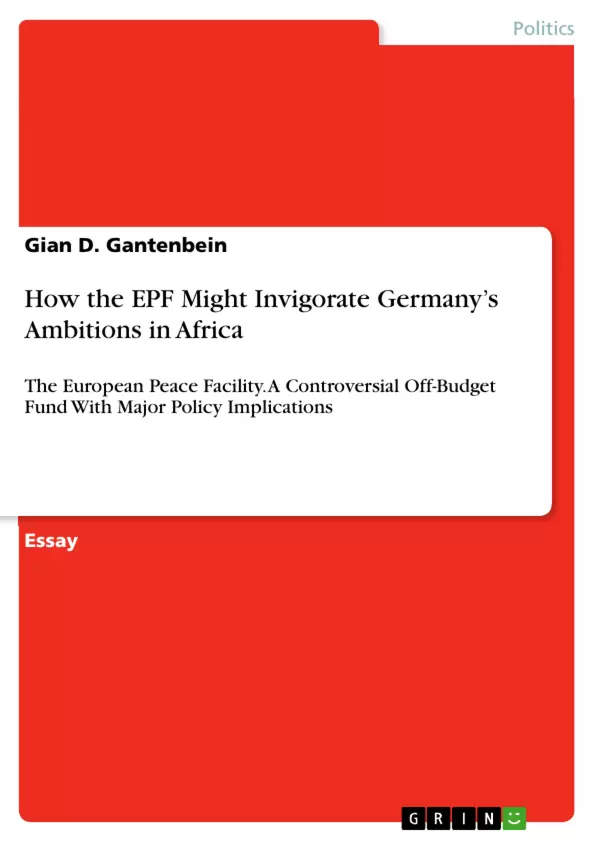This paper shall give an overview over the EU’s new European Peace Facility (EPF), briefly outline the current situation of German policy guidelines and involvement on the African continent, introduce the new opportunities European and German foreign policy makers gain with the EPF and take criticism towards the new EPF into consideration. Furthermore, it shall be discussed if and how the EPF works in accordance with the policy goals defined in the Marshall Plan with Africa.
Inhaltsverzeichnis (Table of Contents)
- I. Introduction
- II. Current situation and developments
- II.1 The European Peace Facility
- II.2 Germany's Foreign Policy Project: The Marshall Plan with Africa
- II.3 Actual German Foreign Policy in Africa and its motivation
- III. Is the EPF in accordance with German and European Values and Policy Ambitions?
- IV. Conclusion
Zielsetzung und Themenschwerpunkte (Objectives and Key Themes)
This paper provides an overview of the European Peace Facility (EPF) and its implications for German foreign policy towards Africa. It examines the EPF's potential to enhance the EU's capabilities in peace and security missions, arms export, and cooperation with regional organizations. The paper also explores the alignment of the EPF with the German "Marshall Plan with Africa" and analyzes the motivation behind Germany's increasing military engagement in Africa.
- The European Peace Facility (EPF) and its implications for German foreign policy in Africa.
- The potential of the EPF to enhance the EU's capabilities in peace and security missions, arms export, and cooperation with regional organizations.
- The alignment of the EPF with the German "Marshall Plan with Africa."
- The motivation behind Germany's increasing military engagement in Africa.
- The broader context of Germany's "civilian power" identity and its evolution in the face of new challenges.
Zusammenfassung der Kapitel (Chapter Summaries)
The introduction presents the context for the paper, highlighting the shift in German foreign policy towards Africa with the introduction of the EPF. The paper emphasizes the EPF's potential for more direct and effective action by the EU and Germany, while also acknowledging its controversial nature.
Chapter II examines the current situation and developments related to the EPF, including its origins, objectives, and potential impact. It also delves into the broader context of German foreign policy towards Africa, highlighting the "Marshall Plan with Africa" and its goals. The chapter concludes by exploring the motivation behind Germany's increasing military engagement in Africa, emphasizing factors such as migration and terrorism.
Schlüsselwörter (Keywords)
Key terms and concepts explored in this paper include the European Peace Facility (EPF), German foreign policy, Africa, peace and security, military engagement, arms export, "Marshall Plan with Africa," migration, terrorism, civilian power, multilateralism, and the African Union (AU).
Frequently Asked Questions
What is the European Peace Facility (EPF)?
The EPF is an off-budget instrument aimed at enhancing the EU's ability to prevent conflicts, build peace, and strengthen international security. It allows for the financing of operational actions under the Common Foreign and Security Policy (CFSP) with military or defense implications.
How does the EPF affect Germany's foreign policy in Africa?
The EPF provides Germany with new opportunities to engage in military cooperation and support missions in Africa, potentially shifting its traditional "civilian power" identity towards a more active security role.
Does the EPF align with the "Marshall Plan with Africa"?
While the Marshall Plan focuses on economic development and partnership, the EPF provides the security framework necessary for such development. The paper discusses whether these two approaches are complementary or contradictory.
What are the main criticisms of the European Peace Facility?
Criticism often focuses on the potential for the EPF to facilitate arms exports to conflict regions and the risk that military aid might overshadow civilian development efforts.
Why is Germany increasing its military engagement in Africa?
Key motivations include the fight against international terrorism, the management of migration causes, and the desire to stabilize the European neighborhood.
- Arbeit zitieren
- Gian D. Gantenbein (Autor:in), 2021, How the EPF Might Invigorate Germany’s Ambitions in Africa, München, GRIN Verlag, https://www.grin.com/document/1022709



